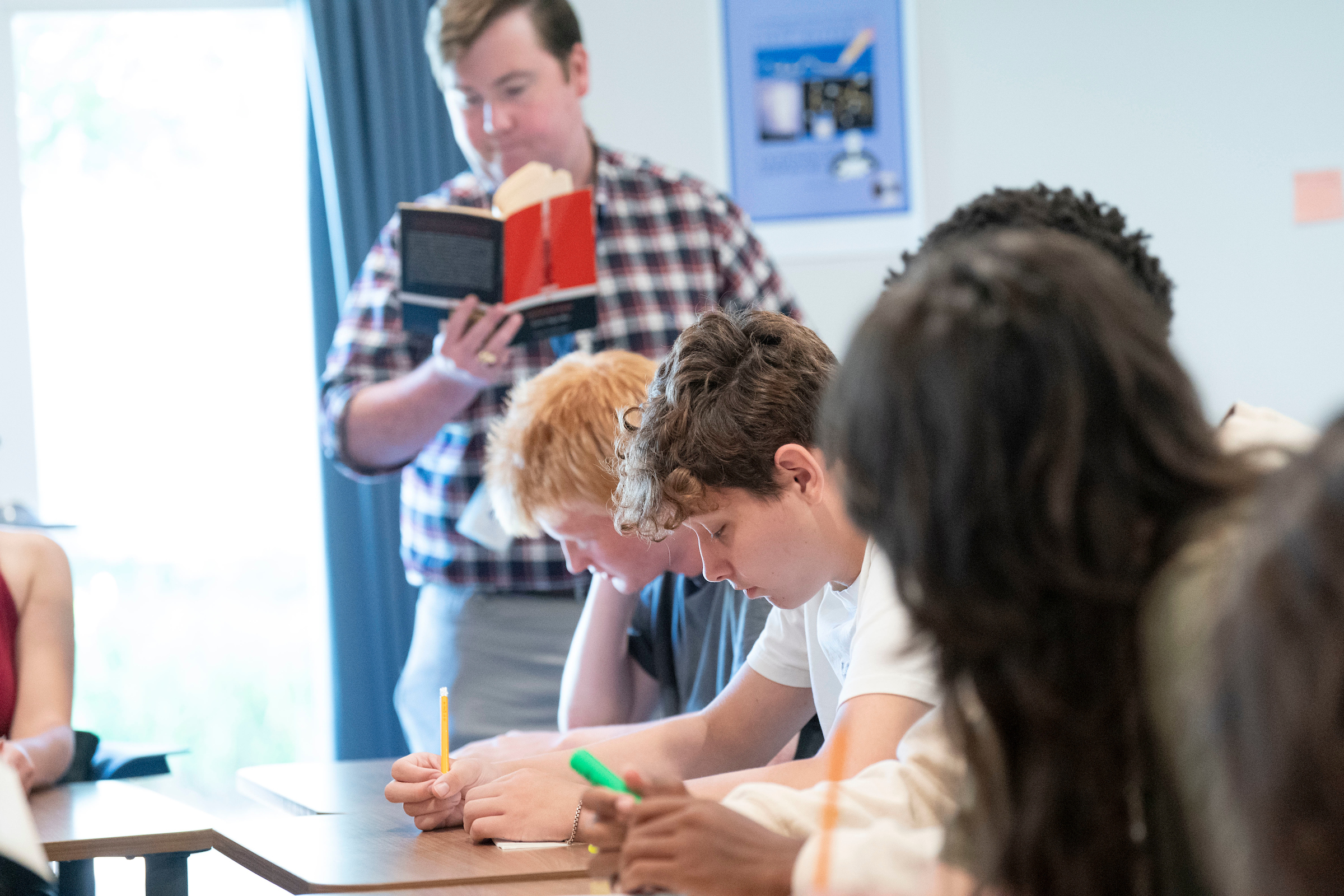
There is no question that English Department Chair and English Teacher Kevin Ford has a deep love for reading. It is a love that is rooted in his childhood experiences. In today's world, students are inundated with distractions and the idea of finishing multiple books a semester can feel daunting, so how do English teachers decide which books students should read? And how do they actually get students reading? Kevin shares some insights.
“[The books] are real… Absolutely real — have pages and everything. I thought they’d be a nice durable cardboard. Matter of fact, they’re absolutely real. Pages and — Here! Lemme show you… a bona-fide piece of printed matter. It fooled me… It’s a triumph. What thoroughness! What realism! Knew when to stop, too — didn’t cut the pages.”
The Great Gatsby by F. Scott Fitzgerald
I read The Great Gatsby as a sophomore in high school in an American Literature survey course. We focused on the classics that year, including The Scarlet Letter (hated it), portions of Moby Dick (we only read the good parts), and Adventures of Huckleberry Finn (I still think about it). But Gatsby was the book I loved.
Nowadays, when I teach a novel I was once taught, I use my original student copy. I love showing my students the (not very insightful) annotations that turned my school paperback into a personal treasure. Though The Great Gatsby is not part of The Field School’s English curriculum right now, rest assured I’ll be ready if we bring it back!
Those annotations remind me that, when I read The Great Gatsby, I was tickled by the irony of reading a book about a guy who never read books! Gatsby has a beautiful, imposing library, but an investigation reveals that none of the beautiful books’ pages are “cut” – the impressive volumes decorating the shelves have never been opened.
It’s an extraordinary passage from Fitzgerald, revealing that Gatsby’s home is a metaphor for its owner, which is probably true for all of us. We want our house guests to believe something about us when they visit our homes; to get an impression of us, for example, from how clean and tidy the house is (or isn’t). And maybe they’ll notice the photographs and art on our walls, and survey the books we’ve displayed in our collections. We’d like to think that our guests will ascribe to us the virtues—cleanliness, good taste, sophistication, intelligence—that we hope their observations suggest. In these moments, we make select elements of our persona apparent.
One of the instructional benefits of teaching The Great Gatsby is an exploration of “appearances vs. reality.” Gatsby has an impressive library; he appears to be a voracious reader, a quality we associate with educational attainment, intelligence, and personal discipline. But when we learn that he never “cut the pages,” we realize the truth: Gatsby is a fraud. For each virtue this library might imply, its opposite is likely more true.
Nevertheless, most readers are attracted to Jay Gatsby. He’s rich and throws great parties. But he isn’t much of a hero or role model. For classrooms exploring this text, that’s okay: students are to explore Gatsby, not become Gatsby!
Unfortunately, it appears that many modern students are heading to college in this Gatsby-esque posture. According to a recent article in The Atlantic, “The Elite College Students Who Can’t Read Books,” “Many students no longer arrive at college — even at highly selective, elite colleges — prepared to read books.” These soon-to-be college grads negotiate a real-life balance of appearances vs. reality— with a degree in hand, they appear educated, capable, and disciplined, but, without an ability to read deeply, the reality might be the opposite.
Among other professors interviewed, Nicholas Dames, who teaches “Literature Humanities” at Columbia University, shared a trend he’s observed over the past few years: current students “seem bewildered by the thought of finishing multiple books a semester.” One student shared that “she had never been required to read an entire book. She had been assigned excerpts, poetry, and news articles, but not a single book cover to cover.”
Thankfully, my experience with students at The Field School diverges from Dames’s at Columbia. I see students of all grade levels reading in various locations around the school, excited for the conversations they will have in class.
Clearly, English teachers play a pivotal role in whether or not students read. It begins with one weighty teacher responsibility: We pick the books.
But how do English teachers make these choices? And what do we, the English Department at The Field School, do that gets students actually reading?
For any English teacher, there are a variety of strategies that might be relied upon for picking books:
Each strategy has strengths and weaknesses.
…And yet, following a curriculum maintains classroom pace and ensures that required material is covered in a timely fashion, guaranteeing a baseline English experience for students.
…And yet, abiding the canon allows students to develop fluency with certain cultural touchstones, like recognizing references to The Great Gatsby, and maintains a worthwhile level of challenge that demands sustained attention.
…And yet, sharing the love inspires passion, community, and positive reading habits.
Field teachers typically use some mix of all three strategies, attempting what I call “a living curriculum.” Working together in grade-level teams and as a wider department, we constantly refine the selections for our classroom bookshelves. We continually read, excited to share the works we’ve loved and the novels we’ve newly discovered. We pore over lists of Booker and Nobel Prize finalists. We seek novels that meet our students where they are, challenge them, inspire joy, and lead to authentic learning.
We noticed when The New York Times recently released its list of “The 100 Best Books of the 21st Century,” albeit a bit prematurely given the century is only in its 24th year! Though it might seem a small number, 5 of the top 100 have been in our curriculum for several years. Personally, I love teaching Cormac McCarthy’s The Road (lucky #13!) to my Juniors. Many more books on the list are being considered by my colleagues for future classes; even more have been read, enjoyed, and set aside for another time.
Field English Department struggles with a dilemma, at once challenging and pleasurable: We have too many great novels to choose from! Our shelves are loaded with books we’ve read and loved, old and new, canon and counterpoint. And we’ve definitely cut their pages.
As tends to be the case with our team, every teacher is incorporating or vetting at least one novel that is new to our living curriculum. For example, I re-read The Great Gatsby, wondering “Is this the year?” while also previewing James by Percival Everett, considering how it might fit into a future unit.
This living curriculum is a cornerstone of English at The Field School. It nurtures the dynamism of our classes, challenges our students, embraces the passions of our teachers, and inspires all our students to “cut the pages” and become lifelong readers.
In case you’re interested, I put the following question to the teachers in our English Department: “What’s one book you're teaching this year that is new in our curriculum?” Here are their responses:
“For my Senior Seminar, students are engaging Victor Villaseñor's Rain of Gold, using it as a jumping board for inquiry into Mexican history and the experience of Mexican-Americans in the early twentieth century.”
“I am teaching The Making of a Poem: A Norton Anthology of Poetic Forms to enhance students' understanding of forms and structures within poetry over time and the job of form in actually inspiring creativity.”
“I’m excited to be bringing Lord of the Flies into the curriculum this year! It’s a balance of beautiful writing with gripping storytelling that allows our students to see that challenge can be fun.”
“This will be our second year reading Life of Pi and All Quiet on the Western Front, both added to the English 10 curriculum late last year. They are two of my favorite novels!”
“All of my senior elective [is new], though Frankenstein comes to mind right away. But I’m also really excited to teach Parable of the Sower by Octavia Butler!”
“In Senior Seminar: Storytelling as Resistance we are currently absorbed in The Handmaid's Tale - a book new to our curriculum this year!”
“With this year's focus on the Election Teach-In… I set Paradise as the summer reading, which explores a community's refusal to engage ‘good faith dialogue’ as Laura Schwartz explores in their other summer read, Try to Love the Questions.”
“I'm very much looking forward to teaching Shakespeare's Twelfth Night!”
~ ~ ~
Sources:
